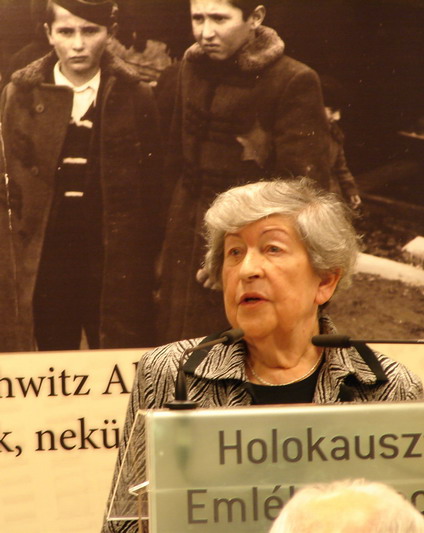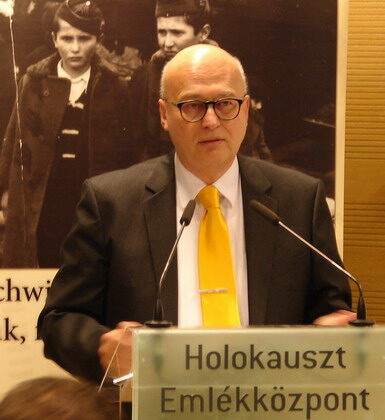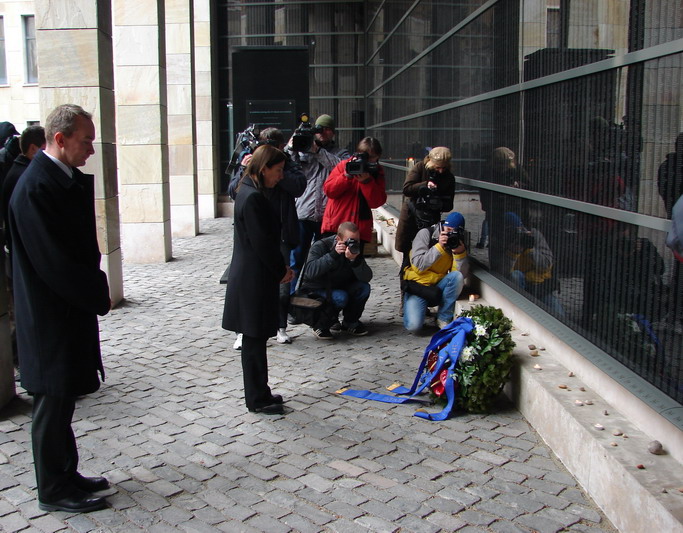At the Holocaust Remembrance Day Commemoration in the Holocaust Memorial Center, Prof. Dr. Máté Szabó, Commissioner for Fundamental Rights called for global efforts against totalitarian regimes and all forms of political violence.
The ombudsman claimed, “the past decades and years has produced tendencies that represent similar challenges as the holocaust itself” and it is not easy to deal with them only with the instruments of the international law and domestic legal system. Máté Szabó considers that the totalitarian regimes, in spite of being destroyed, are constantly replicated or replaced by another throughout the world. He elaborated that incitement and hate speech represent a permanent problem, and even in arts there are products that may contribute to inducing hatred. Legalistic approach is not sufficient to solve these issues, he added, but thorough economic, social and cultural changes are needed. He called for a better protection of symbols and items of symbolic value for certain communities from defilement. Another permanent challenge, according to the ombudsman, is the punishment of the perpetrators and the issue of compensation for the victims. In spite of efforts by many countries, including Hungary, there is no perfect example of solution for these problems in the world.
 Mrs. György Szemes, survivor and coordinator of the Auschwitz Group described the first moments of her arrival to Auschwitz, the shock amplified by the horrible stench of the air, polluted by smoke, odor of the gutters and the smell of burned flesh. Upon their arrival, women were separated from men. The prisoners assisting the sorting whispered to young girls to claim that they were older than their actual age, to get a chance for survival. Following this advice, when asked by the infamous doctor Mengele, she said she was eighteen. In fact, it was her seventeenth birthday.
Mrs. György Szemes, survivor and coordinator of the Auschwitz Group described the first moments of her arrival to Auschwitz, the shock amplified by the horrible stench of the air, polluted by smoke, odor of the gutters and the smell of burned flesh. Upon their arrival, women were separated from men. The prisoners assisting the sorting whispered to young girls to claim that they were older than their actual age, to get a chance for survival. Following this advice, when asked by the infamous doctor Mengele, she said she was eighteen. In fact, it was her seventeenth birthday.
She shared her feelings of a prisoner deprived of all her rights, of all of her belongings, stripped naked by soldiers and “bloodthirsty” women, and being told that there were no return from Auschwitz. She described that the prisoners that had survived to the liberation were half dead, skin and bone skeletons at the arrival of the Russian troops.
The video message of the UN Secretary General, Ban Ki-moon at the occasion of the International Holocaust Remembrance Day was screened to the participants of the commemoration. In the message, the head of the world organization has praised the courage and the moral example of rescuers, who performed their actions facing certain death themselves. He has mentioned by name Raoul Wallenberg, who had saved more than ten thousand of persecuted Jews in Budapest during the Holocaust. The Secretary General has pointed out that this year’s commemorations were devoted to those rescuers, who remained unknown to the public, because their example would help us creating a better world.
Another screening has followed the message from the OUN. The significance of friendship, courage and self-sacrifice has been conveyed by the emotional video clip by film director Lajos Koltai, Dani Rosenberg, announced and praised by cardinal Péter Erdő and by retired chief rabbi in their video messages.
At the ceremony, János Botos, deputy acting director of the Holocaust Memorial Center announced the opening of a chamber exhibition of related items from the collection of the institution. Most of the exhibits, apart of articles for personal use in the camps, were postcards written by prisoners from a fictitious place called “Waldsee”, made up by SS to calm down the anxiety of the population left behind in Hungary.
At the end of the commemoration, flowers and stones of remembrance were laid at the Memorial Wall of Victims, among others, by Ms. Eleni Tsakopoulos Kounalakis, Ambassador of the United States in Hungary and Mr. Csaba Horváth,vice-chair of the Hungarian Socialist Party.

